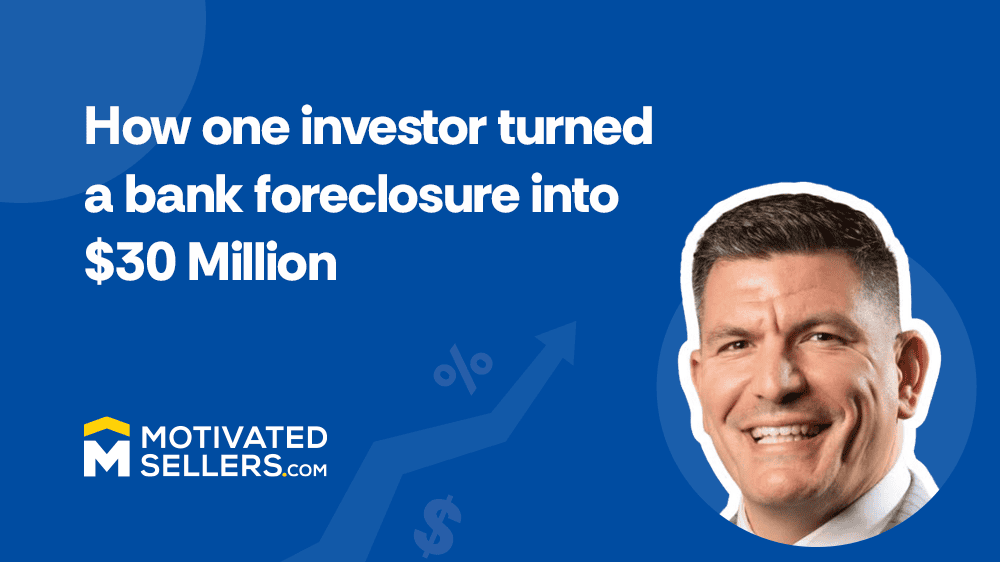

I was clueless after getting out of the military. I was fortunate enough to become a part of the mortgage industry after doing several interviews at different places. That happened in 2003, and the housing market was seeing full-swing growth.
Everyone was investing in properties by tapping into home equity loans. That’s when I first learned about investing.
I was helping investors tap into home equity to buy pre-construction or other properties. I opened my office, replicating the model I was using at America’s mortgage company. From there, I grew to a couple of offices.
As a mortgage professional, I made a lot of money without saving or owning an investment property. I bought my first house at the age of 23 and lost it at the age of 25. The market tanked, and I had no savings. Millions of people lost their homes during that financial crisis, and I was no exception. I was a young father who was also among the very first people who lost their homes to foreclosure.
Losing my home made me want to learn about the foreclosure process in Florida. What’s the difference from other states?
That was my first time learning about judicial and non-judicial states. Without having a job or income, I threw myself back into the industry. I gave my 100%.
It takes around 10,000 hours to become an expert in any niche.
I applied this formula by researching and studying the real estate market for 20+ hours each day. Each morning, I would be reading books, reviewing the FDA’s website, and researching different material. That led me into trading debt (non-performing and no-trade). That deal gave me some confidence and brought me back to level zero.
That was my transition into the housing industry. I became creative regarding how mortgage debt works.
Let’s say I want to buy a pool of 5,000 loans. What happens if I increase the price per unit by just a few cents? What would happen to the portfolio?
In other words, I could carve out free houses for myself while trading these portfolios and giving incredible upside to our investors (investors were acquiring assets from us).
That kept evolving. I became a banker who would modify debt for people facing foreclosure.
The market tanked in 2008, and everyone in the industry had to leave. No one could get a mortgage at that time for years. But there are opportunities to be had in a tough market if you are skilled enough.
We had a very successful trade with the hotel. We bought the debt back from the hotel. I sold the debt back to the hotel at a discount.
Here is how it works: Let’s say I bought the deal for $2, but the borrower owes me $6. Then I can sell the debt back to them for $4 and still make a profit. That’s a win-win situation when the market is suffering from a recession. There is a lot of complex stuff happening between these points in a deal, but you get the idea.
At one point, we were so overwhelmed with opportunities that we had to struggle with choosing the best one. After some success, we moved into commercial non-performing notes. It happened when I sold a big portfolio to a hedge fund.
Always ask this question. You never know the needs of your customers until you ask. I was working with a group of highly intelligent, smart people who were experts at raising capital.
When questioned, they said they were planning to find REO agents nationwide to sell properties. I got that covered for my client.
Then I asked: what are you going to do with construction properties? They wanted to renovate those properties. I told them I had a construction company. That’s exactly when I started my construction company, where we do remodels for banks, and we ended up delivering more than 3,500 remodels.
Math is the language of business. Evaluating a distressed property always boils down to understanding three points: ARV, purchase price, and cost of repairs. Some markets have good appreciation rates, while others provide good cash flow. I want to invest in markets with strong appreciation trends.
Review housing demand vs. availability. Check the absorption rate. How many permits were given in the last month?
It’s our job to go beyond the initial underwriting and peel layers of the onion. Check external influences (both good and bad) because they will impact your investment.
Every problem is an opportunity to solve for.
We use multiple tools like the Buildertrend platform for our new construction projects. We are looking at ClickUp to holistically manage a lot of companies from an operations standpoint. We use MLS and various IDX for brokerages.
I spend a couple of hundred dollars annually on software, excluding the development of our internal software, for both the title and investment businesses.
Robert admits that he doesn’t search for deals. He creates deals.
“As a developer and builder, my biggest advantage is that I don’t compete; I create.”
We have recently acquired a large piece of land and are creating our subdivision on it. We are entitling land in Lake County to build 500 units. The process might take 1–4 years, but one of those projects will yield a profit of $30 million.
Hiring competitive talent remains a tough job for real estate investors. What’s your process for building teams that can grow alongside your business?
“People aren’t willing to put in the work. That goes for both investors and team members. Finding and keeping a good hire takes skill. There are many times when I am waiting for a candidate, and they don’t appear for the interview, wasting everybody’s time. Finding good people is a true limitation these days.
So I align myself with people who want the same thing. We work with people who share the same mindset, like it happens in a potluck dinner.”
There is a difference between having $10,000 and a net worth. There are millionaires out there who face difficulties in meeting the payroll. It may sound strange, but believing in yourself or the outcome is the key to success.
If you believe, it’s going to happen; it will.
Pay attention to KPIs and really understand whether you’re on track or off-track. When you find yourself off-track, make micro-adjustments to your path and get back on track.
The Art of War by Sun Tzu
It’s required reading for all military generals. Here is a quote that had the most impact on me:
“If you know yourself and know the enemy, you need not fear the result of 100 battles.”
“If you know yourself and not your enemy, for every victory gained, you also suffer a defeat.
And if you know not yourself and know not your enemy, you’ll succumb in every battle.”
I won’t worry if I only had $10k and my current wisdom because I know the market and my enemy, which is the market. I know the ins and outs of this industry, and I know how to adjust myself.
On a personal level, I want to finish my book. On a professional level, I want to take over the world. I want to strive towards perfection. I would like to fly more while eventually getting my helicopter license. I want to travel and visit more countries. There is more to the story, and I want to impact more lives through my professional work.